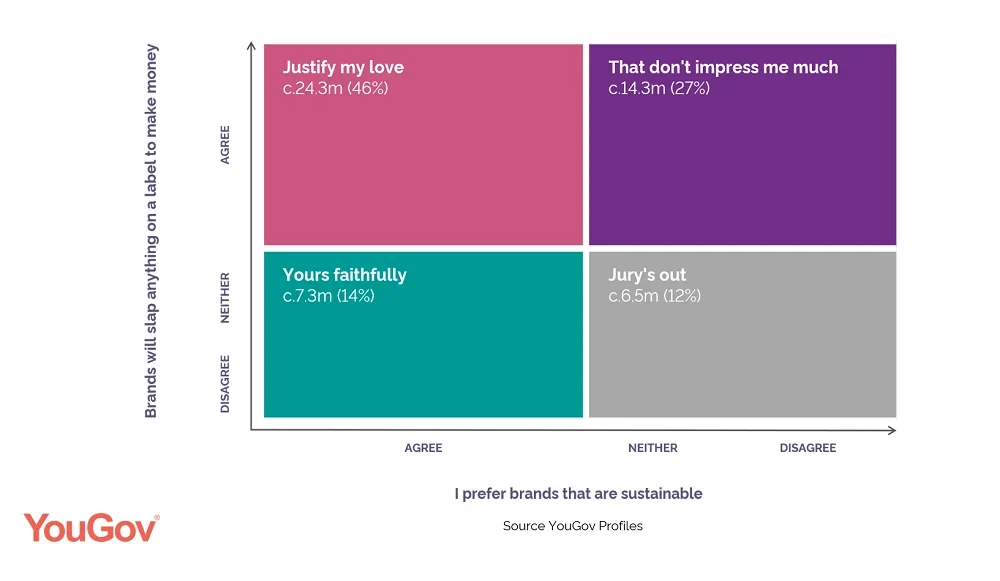A sizeable chunk of the British population professes a preference for sustainable consumer products. But reaching this consumer base in an effective way requires more than just apt package labelling, reveals a new YouGov framework study.
The study, based on YouGov Profiles data, segments consumers in Britain into four groups based on their agreement with the following statements:
1.) "I prefer brands that are sustainable"
2.) "Brands will slap anything on a label to make money"
The groups are designed to represent the varying ease with which marketers of sustainable products can reach consumers, including:
Yours faithfully: Prefer sustainable brands and do not agree that brands will use any label to make money
Justify my love: Prefer sustainable brands but are sceptical about brands’ use of labelling
That don’t impress me much: Show no preference towards sustainable brands and are sceptical about brands’ use of labelling
Jury’s out: Show no preference towards brands that are sustainable but do not agree that brands will use any label to make money
YouGov Framework: Attitudes to brand sustainability and authenticity in Britain
Total GB adult population: 52.4 million

Yours faithfully
This group, which makes up 14% of the British population, is the most accepting of sustainable brands while also being the least suspicious of product labelling. Consumers in this segment are older than the average population, with two in five (44%) aged over 55, compared to 38% in the overall population.
They also appear to be much more sensitive to issues pertaining to the environment in general. For instance, more than three-quarters of them (77%) say climate change is an important issue, compared to 67% in the general population. They are also significantly more likely to be prepared to pay more for products that are environmentally friendly (72% vs 57%).
Justify my love
With one in two consumers (46%) falling in this segment, it represents the biggest chunk of the British population out of the four categories. The good news for marketers of sustainable products is that they prefer brands that are sustainable. The not so good news? This group isn’t openly trusting of product labelling.
With over two in three respondents aged under 55 (70%), this group appears to be a younger demographic than the national population, where 62% of people fall into this age category. Three in four (74%) people in the ‘Justify my love’ category don’t mind paying more for environmentally friendly products. However, three-fifths (58%) believe that avoiding large companies that act unethically is simply too expensive for them.
That don’t impress me much
This group bears an over-representation of males aged over 35; 44% against 34% in the overall population. The consumers here appear to be more concerned with the cost of products rather than issues of sustainability. Over two-thirds (69%) say they don’t care about ‘green’ energy as long as it is cheap, compared to just 46% in the whole population.
People in this category are also a lot less likely to place importance on brands having a clear standpoint on wider societal issues (60% vs 38%). This group, which makes up 27% of the population, is the toughest sell for marketers of sustainable products.










